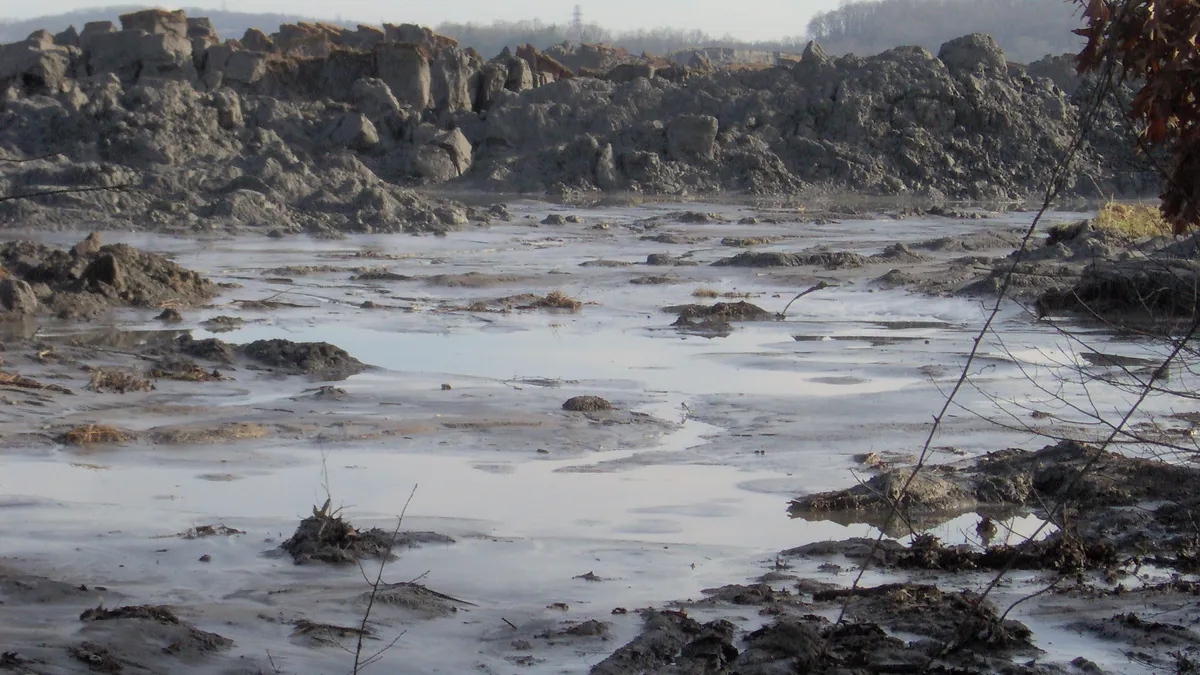Dive Brief:
- The Chairman of the U.S. Commission on Civil Rights told residents concerned about coal ash disposal in a North Carolina city last week that they have the backing of his agency as they work to combat adverse health consequences stemming from the disposal of the coal waste, the Winston-Salem Journal reports.
- The comments came at a hearing held by the North Carolina Advisory Committee for the federal civil rights commission in Walnut Cove, North Carolina focusing on the health and economic consequences of coal ash disposal in predominantly low-income, minority communities. The federal commission has made environmental justice its focus for 2016.
- The hearing reportedly focused on the impacts of 12 million tons of coal ash stored in an unlined basin at a Duke Energy power plant in nearby Belews Creek. Chairman Martin Castro told residents that there was "something wrong" with the broader system of coal ash siting and disposal across the nation, but that they "will have an advocate, not only here but in Washington," in his commission.
Dive Insight:
In January, the U.S. Commission on Civil Rights announced that it would focus its 2016 Enforcement Report on environmental justice, particularly "possible violations of environmental and civil rights laws resulting from improper generation, storage, transfer and siting of toxic materials by public utilities and other sources near minority residential areas."
The commission's advisory committees in states like North Carolina are now holding hearings to compile reports for the federal agency.
In Walnut Cove last week, the hearing focused how to deal with the millions of tons of coal ash in an unlined basin at one of Duke Energy's power plants in Belews Creek, located in Stokes County. Nearly 8 out of 10 residents in the immediate vicinity are black, according to a senior attorney from the Southern Environmental Law Center quoted in the Winston-Salem Journal.
The press release for the event explains that the NC Committee will issue findings and recommendations in a report to be presented to the federal commission after all testimonies are received. In attendance were members of the commission, including chairman Martin Castro, members of the NC Department of Environmental Quality (DEQ), and representatives of Duke Energy, citizen advocate groups and other parties.
Under the Coal Ash Management Act passed in 2014 by General Assembly, Duke Energy is required to excavate coal ash from four of its power plants, and the utility has committed to removing ash from three other plants.
The citizen advocate groups which attended the hearing, including Appalachian Voices and Yadkin Riverkeeper, claimed the DEQ has not been holding Duke Energy accountable for dealing with its combined 150 million tons of coal ash at its 14 power plants.
Tom Reeder, assistant secretary of the NC DEQ, responded to claims in a press release following the hearing, saying that the DEQ and the state would go beyond federal requirements in dealing with the coal ash.
"The McCrory administration will go beyond federal and state requirements to protect minority communities from negative impacts when evaluating Duke Energy’s applications to store coal ash in a new landfill.”
The NC DEQ says it will conduct an environmental justice review of each Duke Energy coal ash landfill and ask the EPA's Office of Civil Rights, the U.S. Commission on Civil Rights, and the North Carolina Advisory Committee to go over and approve any of the state's conclusions on environmental justice before allowing any permits to be issued.
Mark McIntire, Environmental Affairs Director of Duke Energy, who attended the hearing, assured the audience that the utility would comply with all state and federal requirements.
"We’ll try to recycle as much ash as practical and we’ll close the basins by capping them in place or excavating ash and moving it to a lined landfill. According to the EPA, both closure options are proven methods to protect the environment."
He also emphasized that Duke Energy would also consider the concerns of neighbors.
"Our personal approach to working with the well owners is an illustration of how much we care about our communities," he said, according to a transcript from the company. "That also includes a concerted effort to inform and engage with local residents in the areas surrounding our coal facilities to make sure families know how operations might impact them and to listen to their concerns."













